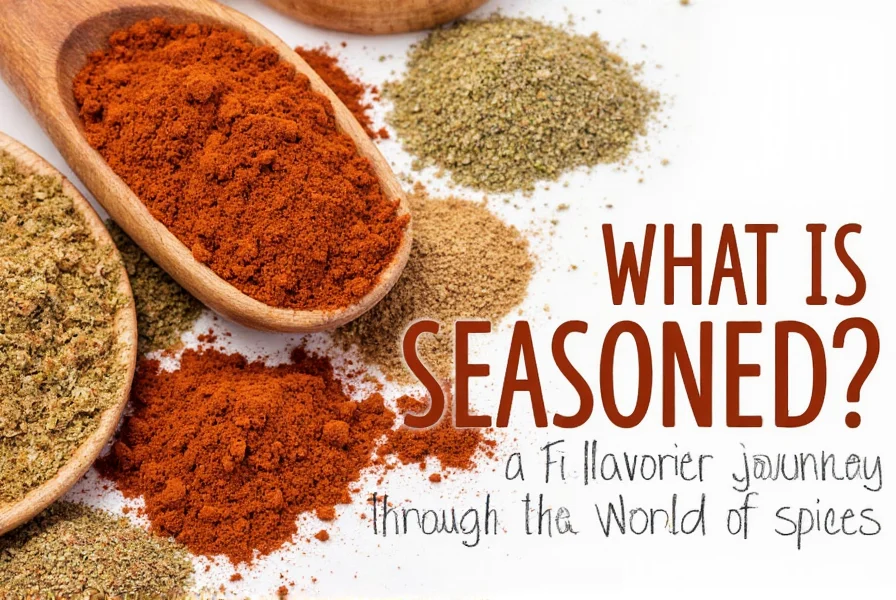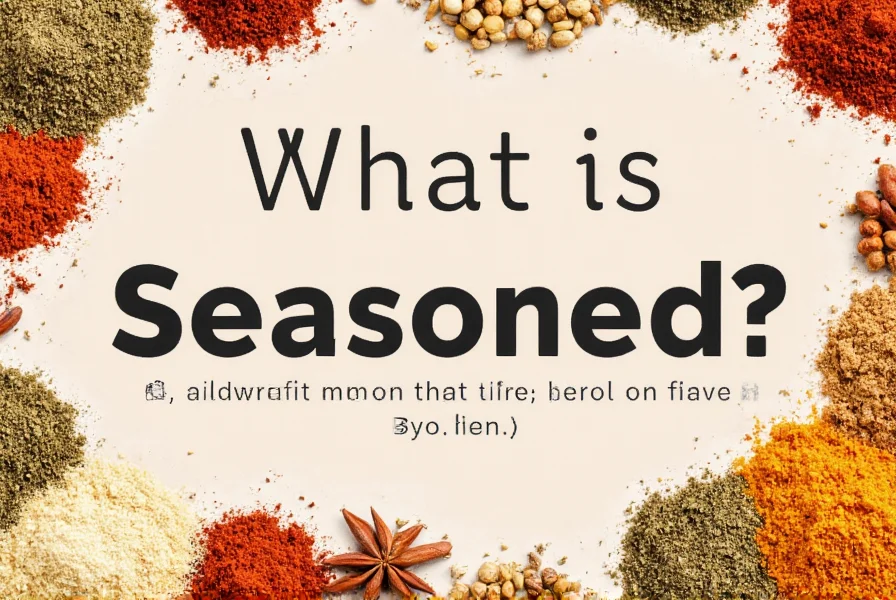What Is Seasoned? A Flavorful Journey Through the World of Spices
Table of Contents
Introduction: What Is Seasoned?
If you've ever taken a bite of a dish and thought, "This tastes like it has a lot of flavor," then you've probably experienced what it means to be seasoned. But what exactly does that mean? In this article, we'll dive into the world of seasoning, explore its role in cooking, and provide practical tips for making your meals more flavorful. Whether you're a spice enthusiast or just starting out, this guide will help you understand the art of seasoning.
Understanding Seasoning in Cooking
In culinary terms, seasoned refers to food that has been enhanced with salt, herbs, spices, or other flavorings to bring out its natural taste or create a more complex flavor profile. Seasoning isn't just about adding salt—it's about balancing flavors and creating harmony in every bite.
Here’s a quick breakdown of common seasoning methods:
- Salt: The most basic seasoning, used to enhance flavor and draw out moisture from ingredients.
- Herbs: Fresh or dried plant leaves, like basil, oregano, or thyme, that add aromatic notes.
- Spices: Ground seeds, roots, or bark, such as cumin, paprika, or cinnamon, that add depth and heat.
- Acids: Things like lemon juice or vinegar that brighten up a dish and cut through richness.
- Oils and fats: Olive oil, butter, or ghee that carry and enhance flavor.

The term seasoned can also refer to ingredients themselves—like seasoned salt, which is a mixture of salt and various spices. These pre-made seasonings save time and offer consistent flavor without needing to measure each component individually.
Practical Tips for Using Seasoned Ingredients
Whether you're cooking at home or experimenting in the kitchen, using seasoned ingredients wisely can make all the difference. Here are some tips to help you master the art of seasoning:
- Start Small: When trying a new seasoning, start with a little and adjust as needed. It's easier to add more than to fix an over-seasoned dish.
- Balance Flavors: Use a mix of sweet, salty, sour, and umami to create a well-rounded dish.
- Season in Stages: Add seasoning early in the cooking process to let the flavors develop, and finish with a final sprinkle before serving.
- Use Fresh Herbs: Fresh herbs have a more vibrant flavor than dried ones. Chop them just before adding to dishes.
- Experiment with Blends: Create your own spice blends to match your personal taste or the cuisine you're cooking.

One of the most important things to remember is that seasoned doesn't always mean 'more.' Sometimes, less is more—especially when working with strong spices like chili powder or garlic. A little goes a long way.
Buying Guide: Choosing the Right Seasoned Items
If you're looking to elevate your cooking with seasoned ingredients, here's a helpful guide to choosing the best options:
| Product | Features | Advantages | Use Cases | Target Audience | Suitable Occasions |
|---|---|---|---|---|---|
| Seasoned Salt | Mix of salt and spices (e.g., garlic, onion, pepper) | Convenient and versatile | For meats, vegetables, and snacks | Cooking beginners and busy individuals | Potlucks, family dinners, casual gatherings |
| Herb Mixes | Blend of dried herbs (e.g., Italian, Mexican, Mediterranean) | Enhances flavor without extra effort | For soups, stews, and sauces | Home cooks and spice lovers | Dinner parties, holiday meals, everyday cooking |
| Spice Rubs | Coarse mixtures for rubbing onto meat or vegetables | Deepens flavor and creates a nice crust | For grilling, roasting, and smoking | Barbecue enthusiasts and outdoor cooks | BBQ events, summer cookouts, backyard parties |
| Flavor Enhancers | Products like soy sauce, Worcestershire, or fish sauce | Adds complexity and umami | For marinades, dressings, and sauces | Chefs and serious home cooks | Special occasions, gourmet meals, fine dining |
When purchasing seasoned items, always check the expiration date and look for high-quality ingredients. If you're unsure about a product, read reviews or ask for recommendations from fellow food lovers.
Remember, seasoned doesn't just apply to the ingredients—it applies to the entire cooking experience. Whether you're using a store-bought seasoning or crafting your own blend, the goal is to create a dish that delights the senses and brings people together.
Conclusion: Embrace the Flavor of Seasoning
So, what is seasoned? It's more than just a word—it's a concept that defines how we enhance our food and bring out the best in every ingredient. From the simplest sprinkle of salt to the most complex spice blend, seasoning is the key to unlocking a world of flavor.
By understanding what it means to be seasoned, you can take your cooking to the next level. Whether you're a professional chef or a home cook, the right seasoning can transform a dish from ordinary to extraordinary.
So, go ahead—experiment, taste, and enjoy the journey of seasoning. After all, life is too short for bland food!










 浙公网安备
33010002000092号
浙公网安备
33010002000092号 浙B2-20120091-4
浙B2-20120091-4